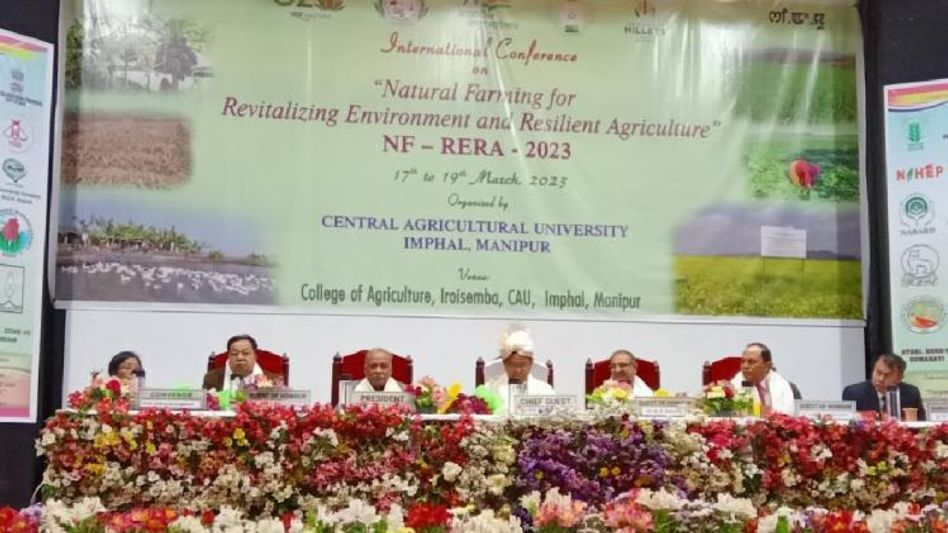Manipur: MoS Dr. Rajkumar Ranjan Singh emphasizes natural farming principles, says it ensures better soil biology
Dr. Rajkumar Ranjan Singh, Hon’ble MOS, External Affairs and Education, Govt. India, spoke at the conference, emphasizing the principles and practices of natural farming.
 MoS Dr. Rajkumar Ranjan Singh emphasizes natural farming principles i Manipur
MoS Dr. Rajkumar Ranjan Singh emphasizes natural farming principles i ManipurNatural farming practices and techniques were the focus of the recently concluded International Conference on Natural Farming for Revitalizing Environment and Resilient Agriculture, organized by the Central Agricultural University, Imphal. The three-day event saw the participation of scientists, teachers, and officers from various universities, including invitees from print and electronic media.
Dr. Rajkumar Ranjan Singh, Hon’ble MOS, External Affairs and Education, Govt. India, spoke at the conference, emphasizing the principles and practices of natural farming. Natural farming is one of the oldest ways of farming, which has been practiced in India for centuries. It emphasizes the use of chemical-free practices and easily available farm resources that are manageable for better economy and conservation of nature in the long term.
According to Dr. Singh, natural farming considers the principles of agro-ecology in its center, integrating crops, trees, and livestock with functional relationships fulfilling the needs of all living organisms. He went on to describe the five principles of nature farming, which are popularly known as the 5 Don’ts: no plowing, no tilling, no weeding, no pruning, and no fertilizers. Dr. Singh expressed his delight in being with the Vice Chancellor of the university and Chairman of National Committee for the development of syllabus of Natural Farming, which will be implemented as UG and PG courses in the ensuing year.
Dr. Singh also noted that the conference was an important effort to transform the dream of the Hon’ble Prime Minister into reality. The vulnerability of small-holder farmers to climate change is very high due to diversity and less capacity to purchase inputs. These factors have forced farmers to leave agriculture. Conventional farming using external inputs and chemicals is leading to soil fatigue, high cost of production, declining factor productivity, and causing an imbalance in the ecosystem. Natural farming is being promoted through Bhartiya Parmparagat Krishi Pariyojna (BPKP) in India to enhance production, sustainability, saving of water use, improvement in soil health and farmland ecosystem. Natural farming is considered a cost-effective farming suitable for the livelihood of a large number of farmers and rural development.
The conference was planned to discuss eight different themes related to the ideology of natural farming, and Dr. Singh expressed his confidence that participants from different countries have already discussed various aspects of natural farming and made some concrete recommendations. The government of India has realized the importance of natural farming and has conceptualized its importance for building the future of the nation and humanity.
Emphasizing their consciousness on natural farming, Rashtriya Krishi Vikas Yojana (RKVY), Paramparagat Krishi Vikas Yojana (PKVY), and Bhartiya Krishi Paddhati (BPKP) Yojana are being implemented in the country to encourage farmers and transform their way of farming into natural farming. During the recent Union budget for 2023-24, the government made a target to transform one crore of farmers into natural farmers in the next three years. The central government will provide a subsidy to establish 10,000 Bio-input Resource Centers in different parts of the country to give the natural farming movement momentum.
The conference was a success in its aim to promote natural farming practices and techniques, and it is hoped that this momentum will continue to grow and lead to a more sustainable and resilient agricultural future for India.
Copyright©2025 Living Media India Limited. For reprint rights: Syndications Today









